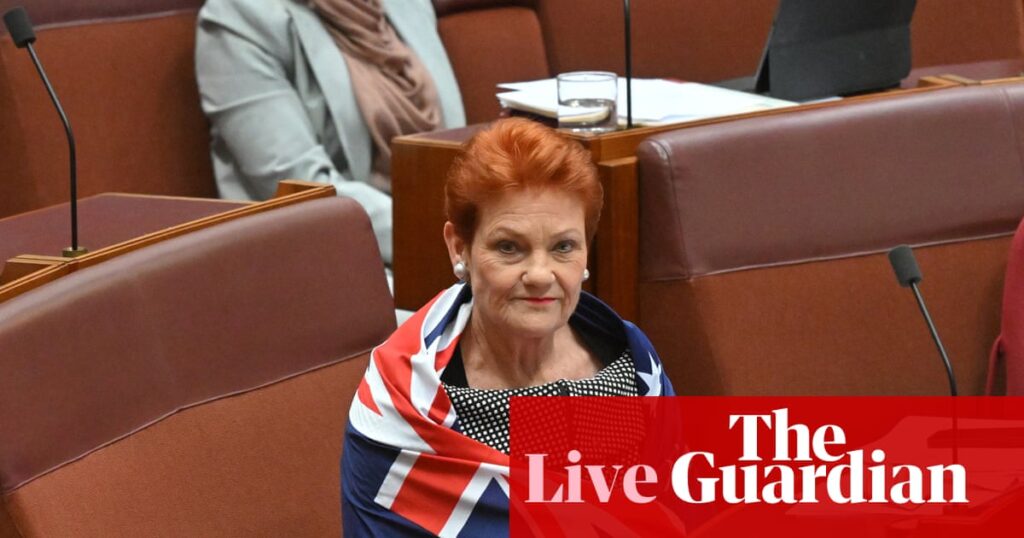
In a dramatic turn of events in Australian politics, two Nationals and a Liberal member crossed the floor to support an immigration inquiry proposal led by Pauline Hanson’s One Nation party. The motion sought to investigate the impact of high immigration levels on the Australian economy but was ultimately defeated in the Senate by 37 votes to 9. This move comes amid a week of heightened tensions surrounding immigration, marked by large public rallies featuring speeches from right-wing activists and neo-Nazis.
The crossing of the floor by Nationals shadow ministers Bridget McKenzie and Ross Cadell, alongside Liberal backbencher Sarah Henderson, has sparked debate within the Coalition. Liberal frontbencher Anne Ruston was reportedly heard urging McKenzie to align with the rest of the Coalition against the motion. Despite the defeat, this incident highlights the growing divisions within the party regarding immigration policy.
Immigration and Public Sentiment
The immigration debate continues to dominate Australian politics, especially following recent anti-immigration protests. Sussan Ley, Deputy Leader of the Liberal Party, reiterated Prime Minister Anthony Albanese’s stance that the protests included individuals with “goodwill,” although they were allegedly “hijacked” by extremists. Ley emphasized the need for the government to address the logistical challenges of accommodating a significant influx of migrants, such as housing and infrastructure.
Labor MP Ed Husic provided a contrasting viewpoint, criticizing the protests as being orchestrated by far-right extremists and neo-Nazis. Husic’s comments reflect the broader concerns within the Labor party about the rise of extremist rhetoric in public discourse.
Aged Care Reforms: A Political Tug-of-War
In parallel with the immigration debate, the Australian government is also grappling with aged care reforms. The Coalition, Greens, and crossbench have pressured the government to release more home care packages, resulting in a deal to immediately release 20,000 packages. This development follows intense scrutiny of Aged Care Minister Sam Rae, who faced numerous questions in parliament regarding the pace of package rollouts.
Rae defended the government’s approach, emphasizing the need for bipartisan support and evolving sector advice. However, opposition leader Sussan Ley criticized the government’s handling of the issue, framing it as a “defeat” for Labor rather than a bipartisan success. Ley vowed to continue pushing for timely delivery of home care packages, highlighting the plight of elderly Australians waiting for essential support.
International Relations and Human Rights
On the international stage, Australia has pledged $1 million to support Afghanistan following a devastating earthquake. Foreign Minister Penny Wong announced the funding, which will be channeled through the Afghanistan Humanitarian Fund, underscoring Australia’s commitment to addressing global humanitarian crises.
Meanwhile, Labor MP Ed Husic has called for measures to prevent dual nationals from joining foreign military forces in cases of potential genocide. Husic’s remarks were directed at the involvement of dual Australian-Israeli citizens in the Israeli Defence Forces amid ongoing conflicts in Gaza. He urged the government to issue a clear statement on the risks associated with such participation.
Social Media Regulations and Youth Protection
In a move to protect young Australians, the eSafety commissioner has instructed major tech companies to prepare for a ban on social media access for individuals under 16. Platforms like Google, Meta, and TikTok have been asked to outline their compliance strategies ahead of the December implementation date. The ban aims to shield minors from inappropriate content and online risks, though it has sparked mixed reactions among parents and children.
Julie Inman Grant, the eSafety commissioner, emphasized that self-declaration of age would not suffice, urging companies to adopt robust age-assurance technologies. This initiative reflects broader efforts to enhance online safety for young users, despite concerns about potential impacts on social connectivity and expression.
As these developments unfold, Australia’s political landscape remains a dynamic arena of debate and reform, with implications for domestic policy and international relations. The coming weeks will likely see continued discussions on immigration, aged care, and online safety, as policymakers navigate these complex issues.






